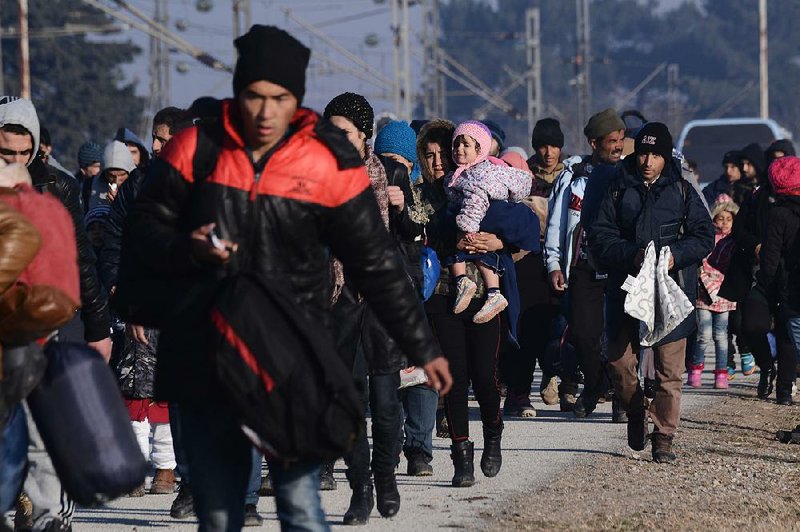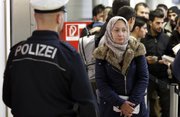Chancellor Angela Merkel's open-door policy on refugees faces a test as German state elections loom and the European Union struggles to find a regionwide solution to the crisis.
The chancellor has adopted a tougher tone and turned away from her inviting rhetoric, which her detractors argue helped fuel a flood of more than 1 million asylum seekers into the country last year. Her Cabinet on Wednesday approved a legislative package aimed at restricting the flow of migrants.
Merkel, who in the past insisted on Germany's moral and legal obligation to take in those fleeing war and oppression, is testing the firmer approach as she grapples with the most serious crisis of her decade-long chancellorship, which has resulted in falling poll numbers and a lack of support from some in her own party.
Her stance at a rally over the weekend was accompanied by a number of law-and-order proposals by others in her government, reflecting the failure to secure an EU deal and growing concern about a loss in support when three German regions go to the polls in mid-March.
"There is a need to recalibrate," said Carsten Nickel, a political-risk analyst at Teneo Intelligence. "It's a pressing problem and it's clear that the noise is only going to increase going into the spring and summer."
At a party event Saturday in the northeastern German city of Neubrandenburg, Merkel said asylum seekers from Syria and Iraq should "return home with the knowledge you've received from us" when the war subsides.
Peter Altmaier, Merkel's chief of staff who oversees the refugee response, said criminal migrants could be expelled to countries other than their home such as Turkey. Labor Minister Andrea Nahles -- a member of the junior coalition partner, the Social Democrats -- said asylum seekers who don't try to integrate may have government benefits curtailed.
Measures backed by Merkel's Cabinet on Wednesday would make it easier for Germany to reject claims for asylum, restrict family reunions and designate Algeria, Morocco and Tunisia as countries to which refugees can safely be sent. Merkel cleared the way for the tougher measures last week by defusing a spat in her coalition over refugee policy that threatened her hold on power.
Merkel also is struggling to find a solution with her EU partners to reduce the influx. Less than a year after she put her credibility on the line with voters to keep Greece in the eurozone, the European Commission on Tuesday sent Prime Minister Alexis Tsipras a list of demands he must meet for his country to retain its privileges as part of the Schengen zone, which guarantees passport-free travel and commerce throughout much of Europe.
Tsipras was told that unless Greece can effectively register refugees and patrol its sea border with Turkey, the commission could seek support from other members to shut their internal frontiers to stem the influx of migrants.
"The migration pressure has not decreased," Dutch Foreign Minister Bert Koenders, whose country currently holds the EU's rotating presidency, told the European Parliament on Tuesday in Strasbourg, France. "Time to address this crisis is running out."
Merkel has pledged to tackle the refugee crisis at its roots, by working to end the 5-year-old civil war in Syria and persuading Turkey to step up efforts to stop the flow of migrants over the Aegean Sea into Greece. Merkel has said she'll reassess that approach after EU leaders meet in Brussels on Feb. 18 and 19. A conference in London today will address financing facilities for Syrian refugees in the region.
More than 60,000 migrants displaced by violence and unrest in the Middle East and Africa arrived on European shores last month alone, more than 10 times the number that arrived in January 2015, according to the United Nations refugee agency. With the possibility of the influx growing as the weather warms in the spring, policymakers say they have about two months to get a handle on the situation.
During that time, three German states -- Baden-Wuerttemberg, Rhineland-Palatinate and Saxony-Anhalt -- will hold elections March 13. While Merkel's Christian Democratic Union may win all three contests, a victory could be mitigated by gains by the anti-immigration Alternative for Germany party, political analysts said.
The shift in the refugee debate was on display over the weekend, when the chairman of the Alternative for Germany party, Frauke Petry, said border guards seeking to prevent illegal migration "should make use of firearms" in extreme cases, according to the Mannheimer Morgen newspaper. She backpedaled from that position this week in the face of public anger.
Information for this article was contributed by Arne Delfs and Jonathan Stearns of The Associated Press.
A Section on 02/04/2016


